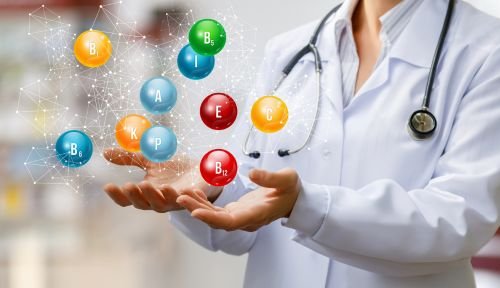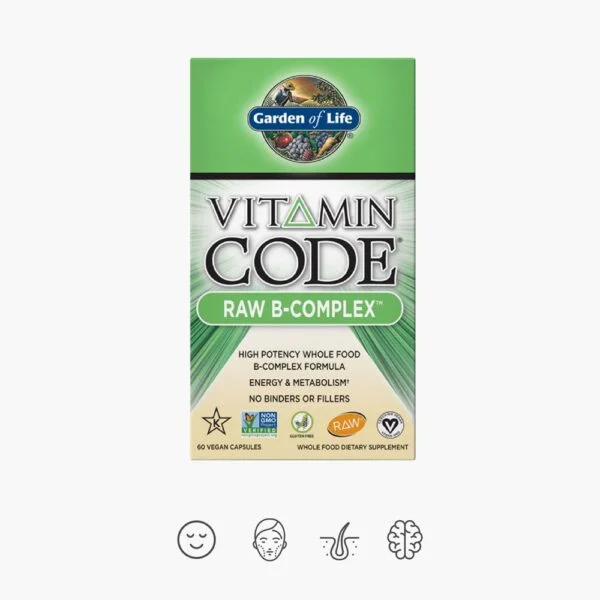Vitamin deficiency is a condition in which the body does not receive or is unable to absorb enough vitamins needed for normal body functioning. Your body requires many different vitamins to function properly, each of which plays an important role in your health.
Vitamin deficiency can cause serious health problems. In this article, we will look at how to recognize the symptoms of vitamin deficiency and how to compensate for this deficiency.
The importance of vitamins for the human body
Vitamins are necessary for the normal functioning and development of the human body. They are involved in various processes in the body, such as tissue formation and energy production. However, it often happens that our body suffers from a lack of vitamins, and we do not take this into account.

Pay attention to the signals
The body sends us various signals when it lacks certain vitamins. This can be a slight bruise after an injury, vision problems, hair loss, etc. If you notice any negative changes, it may indicate that you lack certain vitamins.
Vitamin deficiencies can cause a variety of health problems that can be serious and long-term. However, the symptoms of many vitamin deficiencies are vague and can easily be confused with other health problems.
Causes of vitamin deficiency
Most often, vitamin deficiency is caused by insufficient nutrition. If your diet is insufficient and lacks a variety of nutrients, your body can begin to suffer from vitamin deficiencies. However, there may be other reasons, such as the use of certain diseases or medications. Taking certain medications can interfere with the absorption of vitamins. Also, certain medical conditions, such as diseases of the digestive system, can make it difficult to absorb and use vitamins.
There are also other factors that can increase the risk of vitamin deficiency. For example, pregnant women and vegetarians may be at greater risk of developing certain vitamin deficiencies because they may have difficulty getting all the vitamins they need from their diet.
In the previous article absorption of vitamins and minerals we discussed what is important for the body to absorb as many nutrients as possible.
Taking certain medications can prevent the body from absorbing vitamins.

Symptoms and signs of vitamin deficiency
Vitamin deficiency symptoms can vary depending on which vitamin is lacking, but there are some common signs that can be noticed. For example, fatigue, weakness, skin problems (dry skin, flaky skin), hair loss, fractures and mouth ulcers can be signs of vitamin deficiency.
Other symptoms may be more specific to certain vitamin deficiencies. For example, vitamin C deficiency can cause symptoms of scurvy, which include tooth decay, skin bleeding, and dry skin. Vitamin D deficiency can cause bone pain and weakness, and vitamin B12 deficiency can cause anemia, nerve damage, and psychological problems (anxiety…).
It is important to remember that vitamin deficiency symptoms can be subtle and can develop over time. If you experience any symptoms that worry you, you should see your doctor.
Health consequences of vitamin deficiency
Vitamin deficiencies can have serious health consequences. Each vitamin plays an important role in our body, and a deficiency in any of them can lead to various health problems.
For example, vitamin A deficiency can lead to blindness, and vitamin D deficiency can lead to softening of bones and deformities. Vitamin K deficiency can cause bleeding disorders, and vitamin B12 deficiency can cause nerve damage and psychological problems.
Vitamin deficiencies can also harm yours immune system, which may increase the risk of infections. It can also affect your energy levels, mood, and overall well-being.
Diagnosis of vitamin deficiency
If you or your healthcare professional suspects that you may be deficient in vitamins, he or she may suggest a blood test. Blood test the results can help determine whether your body has enough of certain vitamins.
Your doctor may also ask you to describe your eating habits to assess whether you are getting enough vitamins from food. In addition, he may ask you about any symptoms you are experiencing.
It is also a good opportunity to understand what vitamins may be lacking after a health test "Your Day", at the end of which you will discover which nutrients you are likely to need the most and which supplements will provide the most benefits.
It is important to remember that the diagnosis of vitamin deficiency should be made by a professional health care professional. If you suspect that you may be deficient in vitamins, consult your doctor.

The most common vitamin deficiencies
Vitamin A
Vitamin A is especially important for the vision process. If you notice that it is difficult to see in the dark, itchy eyes or dry eyes and skin, this may indicate a vitamin A deficiency. This vitamin is found in fish, liver, eggs, butter and other dairy products.
Vitamin D
Vitamin D is important for bone mineralization. In the absence of vitamin D, the accumulation of calcium in the bone tissue is disturbed, which can cause bone deformation. The lack of this vitamin can be compensated by consuming fish oil or meat.
Vitamin E
Vitamin E is important for pregnant and lactating women, as well as for couples planning to have children. A lack of vitamin E can make it difficult to conceive and carry a baby, and it can also be the cause of a decreased sex drive. This vitamin is found in fish, liver, eggs, butter and other dairy products.
Water soluble vitamins
Water-soluble vitamins, such as vitamin C, are important for strengthening blood vessels, iron absorption, and boosting the immune system. If you notice traces of blood appearing on your toothbrush or apple, it may mean that you are deficient in vitamin C. This vitamin is found in most fruits, berries and vegetables, especially thistles, cranberries, citrus fruits and sauerkraut.
Vitamin P
Vitamin P is often found where vitamin C is also present, especially in citrus fruits. This vitamin is important for the prevention of colds.
B group vitamins
B vitamins are necessary for the harmonious functioning of our nervous system and the normal functions of the skin and mucous membranes. If you have noticed that the corners of your lips are cracked, your eyes are stinging, stomatitis has started bothering you, it may mean that you lack vitamins B1, B2, B6. These vitamins are found in milk, yeast, fruits and vegetables, cereal crops.

Vitamin deficiency compensation
Vitamin deficiency can be compensated not only by consuming foods rich in vitamins, but also by using food supplements. However, before you start taking food supplements, you should choose the right and quality food supplements well.
Prevention and treatment of vitamin deficiencies usually involve dietary changes and the use of additional vitamins. The most important step to avoid vitamin deficiency is a balanced and varied diet.
If you already suffer from a vitamin deficiency, your doctor may recommend taking vitamin supplements. However, vitamin supplements should not be used as a food substitute, but only as a supplement.
Sometimes treatment may be needed to address the cause of the vitamin deficiency. For example, if a vitamin deficiency is associated with a disease of the digestive system, treatment may be needed to treat the disease.
The importance of a balanced diet
To prevent vitamin deficiency, a balanced diet is very important to prevent vitamin deficiency. Your diet should include a variety of foods that provide all the necessary vitamins.
This includes fruits and vegetables, grains, protein and dairy products. Each of these food groups provides different vitamins, so it's important to eat a variety of foods.
For example, fruits and vegetables are excellent sources of vitamin C, while grains are good sources of B vitamins. Proteins such as meat and eggs are a good source of vitamin B12, while dairy products are a good source of vitamin D.
Excess of vitamins
It is also important to note that not only the lack of vitamins, but also their excess can harm our health. Therefore, it is important not to exceed the recommended dose.

Vitamin Supplements: Do You Need Them?
Vitamin supplements can be helpful for those who cannot get enough vitamins from food or who need higher doses of vitamins due to certain medical conditions.
Vitamin supplements can help fill nutritional gaps, but they should not be used as meal replacements. The best way to get the right amount of vitamins is to eat a varied, balanced diet that includes a variety of foods such as vegetables, fruits, grains, proteins and dairy products.
It is also important to note that taking too many vitamins can also cause health problems. Some vitamins, such as vitamin A, D, E, and K, are fat-soluble vitamins that can accumulate in the body and cause toxic effects if taken in excess. Therefore, it is important to follow the recommended dosage when taking vitamin supplements.
Although a balanced diet is the best way to get the vitamins you need, sometimes it can be helpful to take vitamin supplements. In particular, it can be beneficial for people who cannot get enough vitamins from their diet, such as vegetarians or vegans.
Frequently asked questions about vitamin deficiency
Below are some frequently asked questions about vitamin deficiencies you may have.
What are the symptoms of vitamin deficiency?
As mentioned earlier, the symptoms of vitamin deficiency can be varied and depend on which vitamin is lacking. Some people may experience fatigue, weakness, skin rashes or hair loss. Others may experience mood swings, trouble concentrating, or cramps.
What causes vitamin deficiency?
Vitamin deficiency can be caused by many reasons. One of the main factors is poor nutrition. If your diet lacks certain foods that are sources of vitamins, you may experience a vitamin deficiency. In addition, some health disorders, such as diseases of the digestive system (diarrhea...) can make it difficult for the body to absorb vitamins, which can lead to vitamin deficiency.
Are vitamin supplements safe?
Vitamin supplements are safe to take if the recommended dosage is followed and if quality, natural vitamins are chosen. Taking synthetic vitamins can cause health problems, so it is important to use supplements responsibly.
-
Sale Product on saleGarden of life Vitamin Code RAW VITAMIN C - Vitamin C with antioxidants, probiotics and enzymes, complex, 60 vegan capsules
39,90 €Original price was: 39,90 €.25,90 €Current price is: 25,90 €.Rated 5.00 out of 5 based on 2 customer ratings -
Garden of life Vitamin Code Raw D3 - Vitamin D3 2000 strength, 60 vegetarian capsules39,90 €Rated 5.00 out of 5 based on 1 customer rating
-
Garden of life Vitamin Code RAW B-COMPLEX – vitamins of group B complete with antioxidants, probiotics and enzymes. Bioactive complex, 60 vegcapsules39,90 €Rated 5.00 out of 5 based on 2 customer ratings
Take care of your health by avoiding vitamin deficiencies
Vitamin deficiency is a common problem that many people face. However, with the right information and healthy eating principles, you can avoid vitamin deficiencies and ensure your health.
Eating a balanced diet that includes a variety of foods is one of the best ways to get all the vitamins you need. However, if you cannot get enough vitamins from food due to certain medical conditions, or if your diet is lacking in certain foods, you may want to consider taking vitamin supplements.
Before starting to take vitamin supplements, it is important to consult your doctor who can help you determine what vitamin you are deficient in and what dosage is right for your needs. It's also important to remember that taking too many vitamins can cause health problems, so it's important to use supplements responsibly.
Take care of your health and avoid vitamin deficiency. Depending on your individual needs, this may mean eating a more varied diet, taking vitamin supplements, or both. The most important thing is that your body gets all the vitamins it needs to function healthily.














